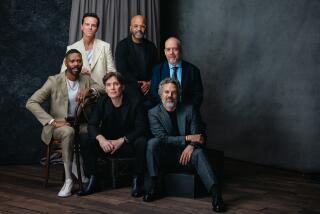THE ATONEMENT AND OTHER STORIES By Louis Auchincloss, Houghton Mifflin: 276 pp., $24
“The Oxford Companion to Twentieth-Century Literature in English,” which offers some 2,400 entries on writers from Guyanese playwright Michael Abbensetts to British biographer Philip Ziegler, contains no mention of Louis Auchincloss. This error of omission is just one example of why Auchincloss’ many admirers consider him one of the most underrated authors in America.
With more than 50 books to his credit, Auchincloss is scarcely a neglected or forgotten figure, but it is hard to disagree with the conclusion that his work has received less than its due. It may be, as some of his defenders allege, a kind of reverse snobbery that has caused his detractors to dismiss his portraits of life among New York’s upper crust as outdated or irrelevant. It is also possible that Auchincloss’ remarkable productiveness has counted against him, leading some critics to consider him perhaps a shade too glib and facile. But surely there is something admirable about the fact that neither his long career as a Wall Street lawyer (from which he retired a few years ago) nor his advancing age (he recently celebrated his 80th birthday) has impeded the flow of his literary output.
Complaints about Auchincloss’ subject matter, per se, demonstrably lack any kind of intellectual validity. There is no more reason to berate a novelist for writing about New York’s Upper East Side than to reproach him for writing about the Lower East Side, or Harlem, or Yoknapatawpha County. But complaints about Auchincloss’ facility may involve more than mere envy at a writer who has managed to be so productive. Is he, perhaps, superficial?
Not in the ordinary sense of the word. In novels like “The House of Five Talents” (1960), “Portrait in Brownstone” (1962), “The Rector of Justin” (1964) and “The House of the Prophet” (1980), Auchincloss tackles profound issues of public ethics and private morality with an impressive blend of intelligence, gravity and subtlety. He also portrays a variety of individuals with keen insight and a sense of their complexity. Furthermore, his stories and novels are informed by a perceptive understanding of the wider social, cultural and political contexts in which they are set, whether it be the world of the 19th century robber barons, the era of the Great Depression and the New Deal or the more cynical age of post-Watergate.
Auchincloss’ longtime publishers, Houghton Mifflin, have issued his latest book, “The Atonement,” to coincide with his 80th birthday and to commemorate their publication of his first novel, “The Indifferent Children,” 50 years ago. The 12 stories collected in “The Atonement” reveal a writer at, or very near, the top of his form.
The scandal of insider trading and the corporate raids of the 1980s provide the background to the title story, in which a man who has profited from his partner’s sharp business practices is made to reexamine his own conceptions of honor and duty. The narrator of “Realist in Babylon” cannot help being shocked when the headmaster of his old prep school invites an unscrupulous media mogul to address the graduating class of 1980.
The chillingly hard-headed woman who found a way to ditch her husband for his best friend tells how she engineered--and managed to survive--the scandal of “The Last Great Divorce,” writing it all down years later for the edification of her daughter. In “Honoria and Attila,” 70-year-old Alix Whelan recounts the story of her sexually venturesome younger sister Kitty, who picked up on the hollowness of her family’s “code” while still a teenager but never succeeded in replacing it with anything more meaningful. At the other end of the ethical scale, the heroine of “Geraldine: A Spiritual Autobiography” remains true to her inner code, even when her closest and most trusted friends assure her it would be acceptable to take advantage of a legal loophole to enrich herself.
Many of the stories in “The Atonement” are told by old people looking back over the social and cultural changes that have taken place over their lifetimes: Although most of these lifetimes, like the author’s, span the crucial middle decades of this century, others are of earlier vintages. In “Lear’s Shadow,” the retired actress recounting her strange experience playing the roles of both Cordelia and the Fool in an unorthodox production of Shakespeare’s great tragedy is looking back from her current vantage point of 1905, thus demonstrating that daringly avant-garde interpretations of classic texts were already going strong in Victorian times. Auchincloss also takes this opportunity to offer the playful yet intriguing theory that Lear’s faithful youngest daughter returns, disguised as the Fool, to be with her father through his harrowing exile. Here, as elsewhere in his fiction, Auchincloss uses literary allusion and his knowledge of cultural tradition to fruitful effect, wearing his erudition lightly and gracefully.
The stories in this collection are, indeed, a representative sampling of the kinds of situations, characters and subject matter that form the core of Auchincloss’ oeuvre as a whole. The dilemma of a Wall Street lawyer who wants to be a novelist--a recurring, and clearly autobiographical, theme for Auchincloss--receives succinct yet thoughtful treatment in “The Hidden Muse.” And in “The Golden Voice,” a moderately successful lawyer’s fear of not having realized his true potential meets up with the equally disquieting possibility that he may not have had all that much potential in the first place. And in one of the best stories in this collection, “The Ancient Greeks,” Auchincloss deftly and brilliantly dissects the complex motivations of an embittered, celibate, homosexual teacher at a boys’ prep school who takes under his wing an idealistic young colleague of similar predilections but greater integrity.
In his “secret but nonetheless perfervid imagination,” Tower, the older man, sees himself as a “plump and princely, richly robed Renaissance cardinal behind whose gilded chair stood a silent hooded Zubaran monk,” his young disciple Edwin Breese. At first, Tower hopes his young friend will share his attitude toward carnal desire, which Auchincloss wittily sums up thus: “Tower detested all sexual irregularity. To tell the truth, he had little enthusiasm for sexual regularity.” When Edwin strays from the path of virtue on a trip to Naples, Tower tells him it is permissible to “sin,” provided one does so only on vacations in Europe, thus keeping that part of one’s life completely separate. What Tower eventually finds intolerable is Edwin’s wish to find a lover he can truly respect and love.
An avowed admirer of Henry James and Edith Wharton, two masters with whom he is often compared, Auchincloss shares their sense of irony and their gift for conveying social nuances. But his clear, almost classically direct prose style has little in common with the sinuous coils of James’ endlessly self-modifying sentences. Like Wharton, Auchincloss is more cut and dried, more interested in coming to the point, less interested in pursuing Jamesian evocations of subjective states of mind and heart.
Auchincloss’ sense of irony and propensity for coming to the point make him particularly adept at the short story and the novella. Working in these relatively concise forms, he is able to cram a great deal into each work. The long stories in “False Gods” (1992) cleverly incorporate echoes of classical mythology; the triptych of novellas in “Three Lives” (1993) examines the complexities and contradictions underlying three character types. Short stories like “The Gemlike Flame” (1953), “The Fabbri Tape” (1983) and “They That Have the Power to Hurt” (1994) may well be considered classics of their kind. Auchincloss is not always so successful in his novels, which, apart from a handful of notable exceptions, have a tendency toward thinness. He scrupulously maps the complexity of his characters’ motives, but he seems to know all the coordinates that determine their actions in advance. The reader may feel he is being invited to survey familiar territory rather than probe uncharted depths. But, as Carol Geiderman has argued in her 1993 biography, “Louis Auchincloss: A Writer’s Life,” the solid reputations of more than a few highly esteemed authors in the literary pantheon (E.M. Forster, Olive Schreiner, F. Scott Fitzgerald) rest on no more than a handful of novels. If a writer like Auchincloss has written books as memorable as “The Rector of Justin” or “The House of the Prophet,” it hardly seems fair to penalize his productivity by holding his less accomplished books against him, especially when these are by no means negligible themselves.
Looking back at the critical reception that Auchincloss has received over the last half-century, one is struck by how frequently he has been panned by reviewers scornful of his “snobbish” subject matter. But he has also been praised by other, more discerning critics for his penetrating insights into the mores of America’s capitalist elite. If there is a problem with Auchincloss’ depiction of these soi-disant aristocrats, it is not that he has chosen them as his subjects in the first place, nor that he fails to expose the hypocrisy, avarice and cynicism besetting them. It is rather that even as he skillfully exposes some of their intellectual and emotional limitations, he never quite escapes to a place beyond the limits of this particular class’ complacency. It’s a world deformed by its own unconscious arrogance, where not only the grasping and materialistic are deaf to higher things but where even the more sensitive and cultivated seldom get beyond a dilettantish appreciation. The genius of great art, the passionate intensity of great love, even the pains of loss and sorrow are seen through a kind of distancing lorgnette that miniaturizes everything in its purview.
Is Louis Auchincloss a great writer, a serious writer, a major or a minor writer? When such a question is put to me, I, for one, am generally inclined to say, “Compared with whom?” Auchincloss’s reputation has suffered on account of the shopworn syndrome, particularly prevalent among reviewers of the 1950s and early 1960s, of keeping a constant vigil for the advent of the Great American Novel. This led, ironically, to the wild overvaluation of talented but far from “great” writers such as John Updike, Norman Mailer, William Styron, Saul Bellow and Thomas Pynchon. The remarkable burgeoning of literary genius in the first part of our century, when novelists like Marcel Proust, James Joyce, Franz Kafka and Thomas Mann transformed the very genre, may well have contributed to this thirst for the Next Great Book. Considered in the context of “Ulysses,” “The Trial,” “Remembrance of Things Past” or even Balzac’s splendid 19th century achievement in “The Human Comedy,” Louis Auchincloss’ body of work seems less than major. But placed alongside the work of most of his postwar contemporaries, his urbane, elegant and probing fiction more than holds its own.
More to Read
Sign up for our Book Club newsletter
Get the latest news, events and more from the Los Angeles Times Book Club, and help us get L.A. reading and talking.
You may occasionally receive promotional content from the Los Angeles Times.









